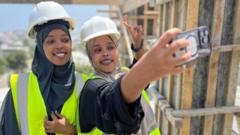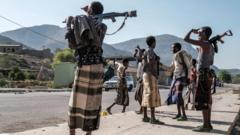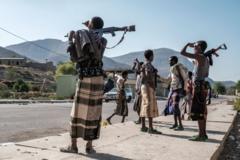The finale has sparked debate on cultural values versus modern entertainment, showcasing personal stories of ten women vying for one man.
**Ethiopian Dating Show Breaks Cultural Norms and Sparks Controversy**

**Ethiopian Dating Show Breaks Cultural Norms and Sparks Controversy**
The innovative dating series 'Latey: Looking for Love' challenges traditional Ethiopian courtship rules.
Ten women, one man. This unconventional setup might sound familiar to reality TV enthusiasts, but in Ethiopia, it's a bold departure from traditional dating customs. 'Latey: Looking for Love,' a dating show akin to American favorites like 'The Bachelor,' has captivated audiences and stirred controversy since its debut on YouTube, particularly by shifting the private nature of Ethiopian courtship to a public stage.
The show revolves around ten women competing for the affection of an Ethiopian-American man, Messiah Hailemeskel, aged 38. He engages contestants—who are varied in their professions from hotel managers to accountants—in unique challenges, including sports events and unusual contests, such as creating advertisements. The finale of this series has garnered over 620,000 views, showcasing its significant impact.
Bethel Getahun, 25, emerged as the winner and described the experience as "surreal." Despite acclaim, the show has drawn criticism from some Ethiopian viewers who argue that the premise objectifies women. Vlogger Semere Kassaye, 41, articulated concerns, stating that the show's format undermines women by treating them as prizes to be fought over. This sentiment resonates with various audiences, who express that traditional relationship-building in Ethiopia remains a private affair best left out of public spectacle.
Bethel, however, counters these criticisms, arguing that the show reflects a diverse spectrum of women's realities in Ethiopia. Throughout 'Latey,' women share personal stories that reveal their struggles and aspirations, such as actress Vivian's poignant revelations about fleeing military conscription in Eritrea, and model Rahel's sacrifices for her family. Producer Metasebia Yoseph emphasizes that 'Latey' is not hyper-sexualized and encourages discussions about Ethiopia's cultural identity.
This bold venture has delighted many viewers who appreciate the show's departure from cultural conservatism. D!nkTV, the production company behind 'Latey,' has announced plans for a second season, which may feature a woman selecting from a pool of ten men in a reversal of roles.
As for Bethel and Messiah, the current state of their relationship remains uncertain due to distance, but Bethel cherishes her bond with the other contestants, whom she considers her "sorority." She hopes 'Latey' paves the way for more authentic representations of women in Ethiopian media, asserting, "It is a new way of showcasing women and how they express themselves."
The show revolves around ten women competing for the affection of an Ethiopian-American man, Messiah Hailemeskel, aged 38. He engages contestants—who are varied in their professions from hotel managers to accountants—in unique challenges, including sports events and unusual contests, such as creating advertisements. The finale of this series has garnered over 620,000 views, showcasing its significant impact.
Bethel Getahun, 25, emerged as the winner and described the experience as "surreal." Despite acclaim, the show has drawn criticism from some Ethiopian viewers who argue that the premise objectifies women. Vlogger Semere Kassaye, 41, articulated concerns, stating that the show's format undermines women by treating them as prizes to be fought over. This sentiment resonates with various audiences, who express that traditional relationship-building in Ethiopia remains a private affair best left out of public spectacle.
Bethel, however, counters these criticisms, arguing that the show reflects a diverse spectrum of women's realities in Ethiopia. Throughout 'Latey,' women share personal stories that reveal their struggles and aspirations, such as actress Vivian's poignant revelations about fleeing military conscription in Eritrea, and model Rahel's sacrifices for her family. Producer Metasebia Yoseph emphasizes that 'Latey' is not hyper-sexualized and encourages discussions about Ethiopia's cultural identity.
This bold venture has delighted many viewers who appreciate the show's departure from cultural conservatism. D!nkTV, the production company behind 'Latey,' has announced plans for a second season, which may feature a woman selecting from a pool of ten men in a reversal of roles.
As for Bethel and Messiah, the current state of their relationship remains uncertain due to distance, but Bethel cherishes her bond with the other contestants, whom she considers her "sorority." She hopes 'Latey' paves the way for more authentic representations of women in Ethiopian media, asserting, "It is a new way of showcasing women and how they express themselves."



















